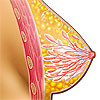Effective breast cancer prevention drugs underused
Women at high risk of breast cancer are missing out on drugs that have been shown to reduce the risk of developing the disease, according to an article in the December issue of the Medical Journal of Australia.
Associate Professor Kelly Philips, from the Peter MacCallum Cancer Centre in Melbourne and coauthors, said that there is level 1 (strong) evidence that selective oestrogen receptor modulators (SERMs) reduce breast cancer risk by up to 40% in women at high or moderate risk of breast cancer, but these agents were rarely discussed with women.
Fewer than 3% of 3788 women at high risk of breast cancer enrolled in a national study had used SERMs, such as tamoxifen or raloxifene, for prevention.
The authors said that while online tools are now available to help doctors to assess a woman’s breast cancer risk and therefore whether she might benefit from SERMs, there is an urgent need for doctors to incorporate use of these tools into their practice and to discuss SERMs as an option for women found to be at increased risk.
“Improved education and decision support for clinicians may help reduce the controversy surrounding the use of SERMs for breast cancer prevention and ultimately reduce breast cancer incidence”, they wrote.
Doctors may be reluctant to prescribe these drugs because they are not subsidised on the Pharmaceutical Benefits Scheme; however, they are relatively inexpensive (less than $1 per day for tamoxifen) and likely to be within the means of most patients, the authors wrote.
Concern about side effects was another probable barrier to uptake; however, there could be an overestimation of the risk of rare side effects, because doctors tend to convey relative, rather than absolute, risks they wrote. For example, although tamoxifen doubles the risk of blood clots, a pre-menopausal woman’s baseline risk is very small. In fact the absolute risk is similar to that of women taking the oral contraceptive pill.
The authors highlighted that the National Breast and Ovarian Cancer Centre had recently revised its guide, which now suggests consideration of SERMs for women with moderate or high risk of breast cancer.
(Source: Australian Medical Association (AMA): Medical Journal of Australia)
More information
 | For more information on breast cancer, types of breast cancer and its investigations and treatments, as well as some useful videos, see Breast Cancer. |
Dates
Created by:

 Login
Login














